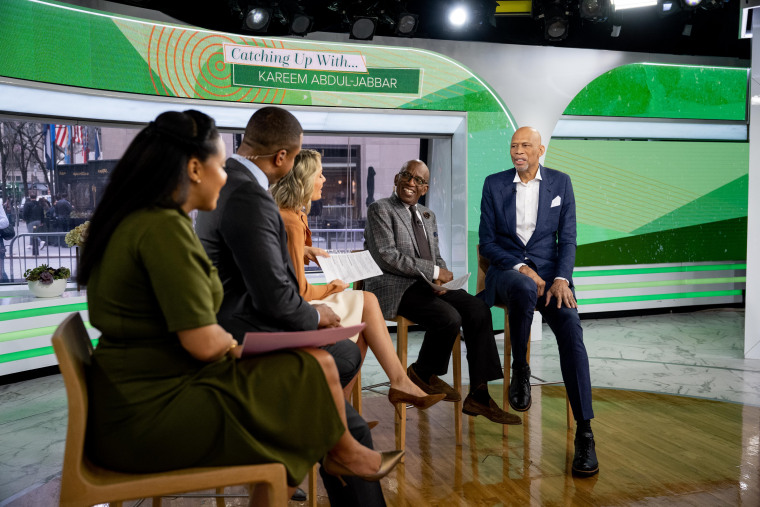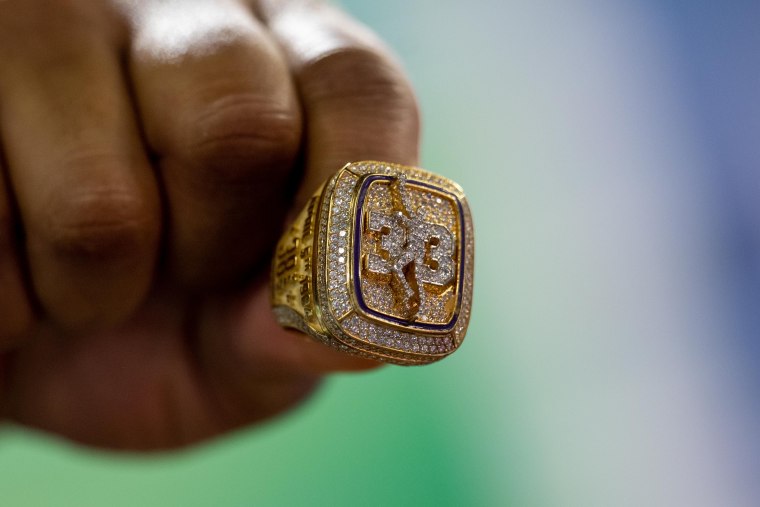Basketball legend Kareem Abdul-Jabbar said he first noticed symptoms of what would be a diagnosis of atrial fibrillation when he was on vacation with his son in Europe.
"I had shortness of breath, fatigue, I had no energy. I was worried about it, but it wasn't consistent. It would come and go," Abdul-Jabbar said on Feb. 16 segment on the TODAY show. "I thought, "Hey, I'm in the shape of my life. It's not going to affect me.'"
But he returned to the U.S. and was attending a Los Angeles Dodgers game when he suddenly didn't have the strength to get up, and his breathing became heavy, he said.

"They had to help me out to my car. While I was going past the trophy case, I collapsed against it," he said. "It was rough. And I didn't know what was going on — that was the whole problem. I didn't understand what was happening."
Abdul-Jabbar said he was taken straight to the hospital, and doctors told him about his condition, atrial fibrillation.
According to Mayo Clinic, atrial fibrillation is an irregular and usually rapid heart rhythm that can lead to blood clots in the heart. The condition increases the probability of having a stroke by a factor of five, Abdul-Jabbar said, and it can also increase the risk of heart failure.
"It can kill you," Abdul-Jabbar said.
Abdul-Jabbar has partnered with pharmaceutical companies Bristol Myers Squibb and Pfizer's "No Time to Wait" campaign to raise awareness of the symptoms of atrial fibrillation, and to encourage others to speak with medical professionals if they have symptoms.
About 12.3 million people in the U.S. are projected to have atrial fibrillation by 2030, according to the Centers for Disease Control and Prevention, but many remain undiagnosed because they don't have symptoms.
People of European descent are more likely to have AFib than African Americans, and more women than men develop AFib, per the CDC.
"In my experience, I have seen many patients ignore or dismiss their symptoms, potentially delaying diagnosis and treatment,” Dr. Andrea Russo, director of cardiac electrophysiology and arrhythmia services at Cooper University Health System, said in a press release about Abdul-Jabbar's partnership with "No Time to Wait."
"Because AFib can lead to serious consequences, including increasing the risk of stroke, it’s critical individuals are empowered to speak with a health care professional about any symptoms they may have," Russo continued. "No symptom or concern is too small or insignificant."
Abdul-Jabbar shared a similar message on TODAY.
"Go get checked. Go to the hospital," Abdul-Jabbar urged.
The TODAY co-hosts also asked Abdul-Jabbar about watching LeBron James break the NBA scoring record last week, which Abdul-Jabbar had held for nearly 39 years.
Abdul-Jabbar attended the Feb. 7 game and watched James score his 38,388th point. Abdul-Jabbar called it a "special moment" and shared what he told the Los Angeles Lakers forward.
"I just said congratulations," Abdul-Jabbar said he told James. "You definitely have earned this. There's no two ways about it."
TODAY's Craig Melvin, resident sports lover, couldn't let Abdul-Jabbar leave without scoping out his Lakers-themed ring.

"I've been fortunate in my career to see a lot of championship rings up close," Craig said. "I've never seen a ring like the ring that Kareem Abdul-Jabbar. Can we zoom in? Can I hold it?"
Abdul-Jabbar said sure and explained the Lakers gave him the ring "to show the Lakers' appreciation for what I did for the franchise."
As Craig showed off the rock to the camera, TODAY co-host Dylan Dreyer asked what it felt like to hold it.
"Oh, it's the heaviest ring I've ever felt," Craig replied.
